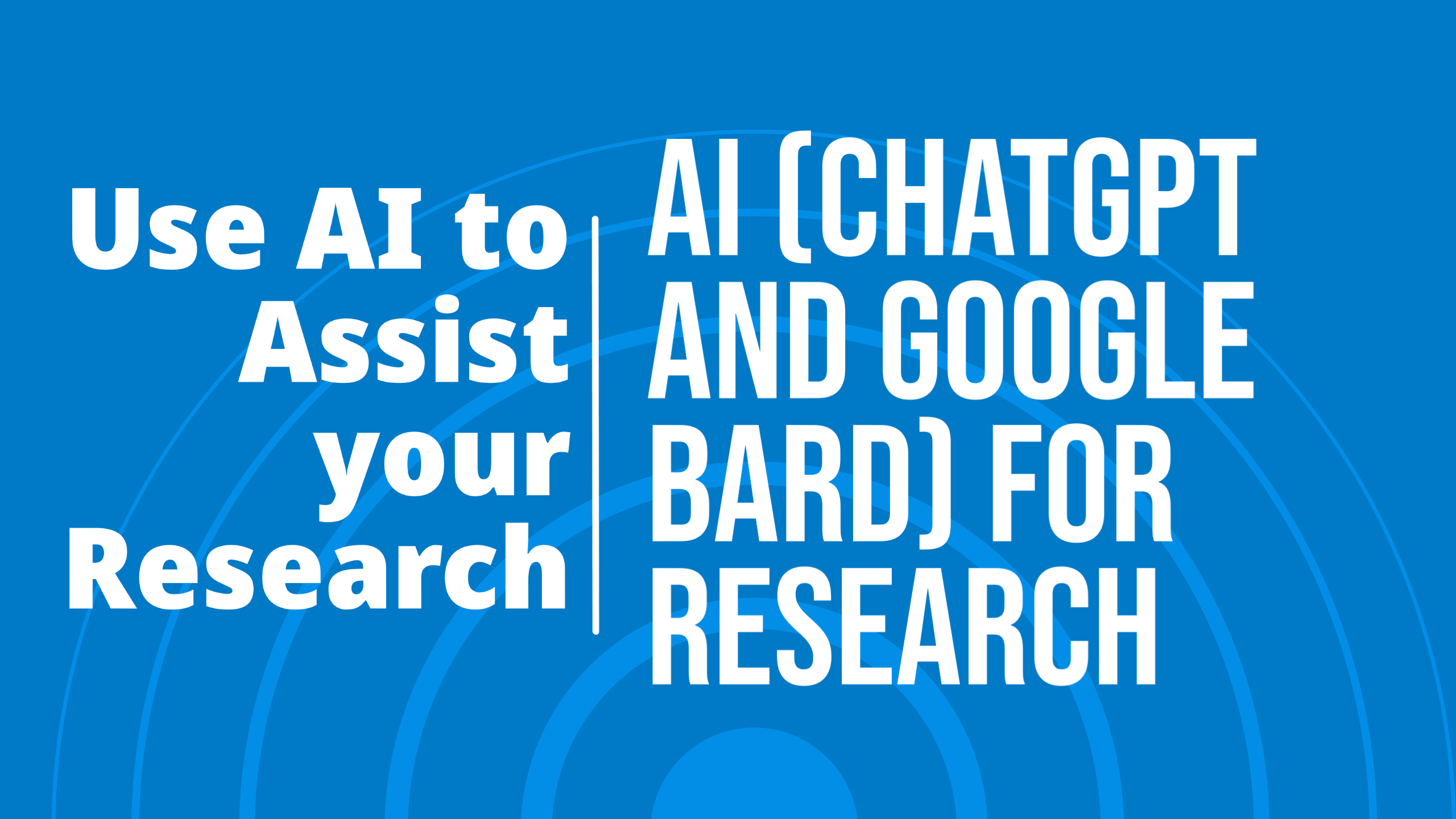Artificial Intelligence (AI) for Research
What is it All About ?
Artificial intelligence (AI) is rapidly transforming the way we research and learn. AI-powered tools are now being used to automate tasks, analyze data, and generate insights that would have been impossible to achieve just a few years ago.
This page explores the many ways that AI is being used in research today. We will discuss how AI is being used to:
- Automate tasks: AI can be used to automate many of the tedious and time-consuming tasks that are involved in research, such as data analysis, and literature review. This frees up researchers to focus on more creative and strategic work.
- Analyze data: AI can be used to analyze large datasets that would be impossible to analyze manually. This allows researchers to identify patterns and trends that would have been invisible to them before.
- Generate insights: AI can be used to generate insights from data. This can help researchers to understand complex problems and develop new solutions.
Utilizing Artifical Intelligence (AI) for Literature Review and Research: A Guided Approach
1. Preliminary Considerations: Learning Research First
The debate on the judicious use of AI tools prompts a contemplation of their role in research endeavors. The suggested approach posits that a foundational understanding of research principles should precede the incorporation of AI tools. Viewed as assistants, these tools are most beneficial when wielded by researchers who have honed their craft, discerning what, when, and where to write.
2. Application in Literature Review: Extracting Definitions
Navigating the realm of literature review, an example unfolds in exploring servant leadership definitions. ChatGPT proves instrumental in providing multiple definitions, yet caution is advised. The extracted information’s value hinges on the researcher’s ability to comprehend and contextualize it within their own study.
3. Scrutinizing Definitions: Verifying References
The process extends to requesting references for the provided definitions. An essential cautionary step, as with the free version, inaccuracies may arise. Researchers are urged to independently verify references through platforms like Google Scholar to ensure accuracy.
4. Querying Specific Topics: A Directed Approach
The tutorial extends to querying specific topics within the literature review. Illustrated with an example seeking insights into why servant leadership is relevant for modern leaders, the researcher solicits ChatGPT’s input. However, emphasis is placed on using such tools judiciously, underscoring the researcher’s responsibility in assimilating the provided information seamlessly.
5. Cautionary Approach: Learning Before Utilizing
Throughout this guided approach, a recurring theme emphasizes the cautionary integration of AI tools. Researchers are urged to refrain from solely relying on ChatGPT, underscoring the importance of an informed understanding of research concepts, structures, and methodologies.
In conclusion, this tutorial advocates for a symbiotic relationship between researchers and AI tools. Embrace ChatGPT as an assistant, not a replacement, ensuring that the fusion of technology and research prowess yields optimal results. Stay tuned for additional sessions on leveraging ChatGPT for diverse research sections.
How to use AI for Research?

Learn to use AI Based Tools like ChatGPT and Google Bard for Research
The tutorial is a step by step guide on how to use different AI tools for research.
Do Like and Share the Videos
Video Tutorials
The Playlist has several different videos on how to use ChatGPT and Google Bard for Research Purposes.
- Learn to use the AI tools (ChatGPT and Google Bard)
- for Literature Review and solve the problem of Incorrect Reference provided by ChatGPT
- to write the research introduction and search relevant theory
- to learn SPSS and statistical output
- to report results
- to search for research Gaps and design a research framework
- to find research questionnaire to measure the constructs in the study
-

How to use #ChatGPT for #Literature Review and #Research? With a Word of Caution!
-

Incorrect References by #ChatGPT! Finding the Right References for Literature
-

#ChatGPT for Literature - How to use #ChatGPT to Write a Research Introduction?
-

#ChatGPT for #Literature - Using ChatGPT to Search a Theory
-

#ChatGPT with #SPSS: How to use ChatGPT to understand and report #Correlation Analysis from SPSS
-

AI Tools for #Literature - How to use #ChatGPT and #Elicit for Literature Search and Writing
-

#ChatGPT and SPSS - How to use #ChatGPT to Interpret and report Correlation Matrix
-

AI Tools for Research - AI Paper Checker and Online Academic Writing Tool
-

#ChatGPT for Research: How to use #ChatGPT to Generate Hypothesis Statements?
-

How to use #ChatGPT and #SPSS for Independent Samples T-Test?
-

#ChatGPT for #Research: How to use ChatGPT with #SPSS for Descriptive Statistics?
-

#ChatGPT for Research: How to use ChatGPT to Address Reviewer Comments?
Additional Resources
- 10 Minute Research Methodology
- Data Analysis using SmartPLS3
- Data Analysis using SPSS
- How to Search for a Research Topic
- How to Write for High Impact Factor Journals
- Quick Guides to Research
- Searching and Writing the Literature Review
- SEMinR Lecture Series
- SmartPLS4 Tutorials Series
- Social Sciences Research Tutorials
- SPSS AMOS Software for SEM
- SPSS Hayes Process Macro Lecture Series
- Understanding the Research Methodology